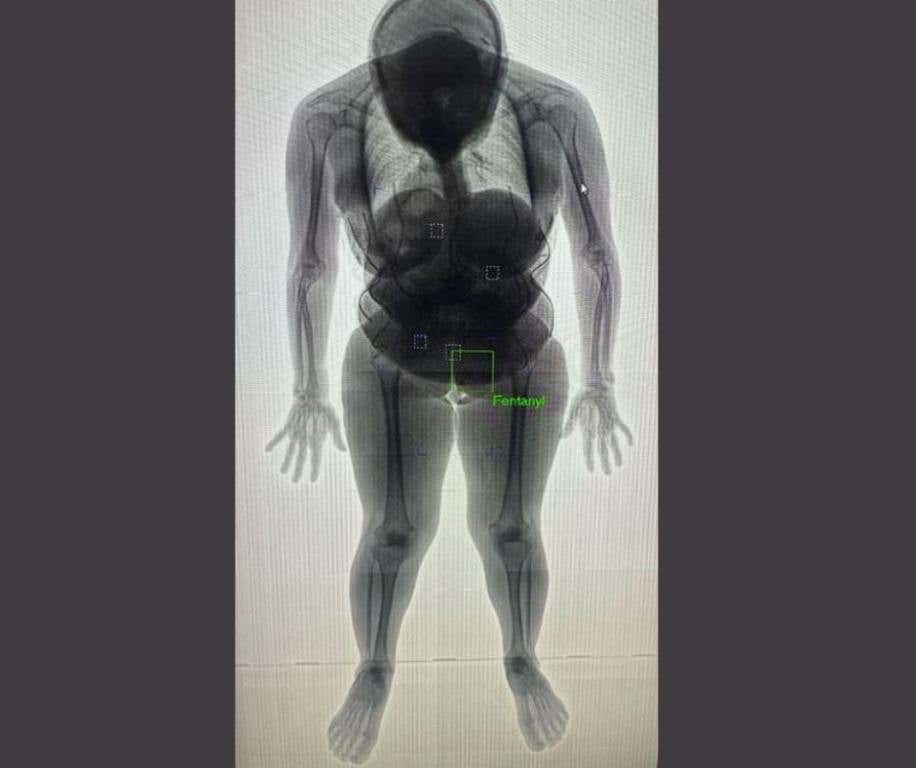
July 3rd was a rough day for one Female Florida Inmate in Walton County. According to a Facebook post from the Walton County Sheriff's Office, she got nabbed for possession of a controlled substance and ended up in the county jail. Now, normally, getting booked isn't a glamorous experience, but Walton County Jail isn't playing around. They got this fancy new digital body scanner with narcotic detection software. It's like having RoboCop, but just for drugs.
So, they scan her, and lo and behold, the scanner shows something a little suspicious. on this Florida inmate It's like when you see that one sock in the laundry that doesn't belong. The deputies see this weird change in color on the scan, and they know something's up. It's contraband time!
Florida Inmate Busted:
Now, here's where things get a bit uncomfortable. Two female deputies step in to do a strip search. Nobody's happy about it, but, it's the job. And yes, this lady produces Fentanyl from a body cavity. They found it right in her… Let's just call it her "Jail purse." The deputies safely collect the Fentanyl, and it goes straight into evidence. Because carrying drugs in your body is one thing, but trying to smuggle them into jail? That's a whole new charge.
 (Photo by Drew Angerer/Getty Images)
(Photo by Drew Angerer/Getty Images)Thanks to Florida State Statute 901.211, anyone coming in on serious charges gets the full search treatment. Whether it's capital felonies, violent crimes, or felony drug charges, everyone gets scanned and possibly strip-searched. It's not just for fun; it's to keep the jail safe from dangerous stuff sneaking in.
The new digital scanner and some determined deputies made sure this Fentanyl didn't make it past the gates. The system worked, and they stopped a potentially dangerous situation right in its tracks.
In Walton County Jail, they aren't messing around. You come in, you get scanned, and if there's any funny business, they're going to find it. Keeping the facility safe is the top priority, and they're using every tool in the box to make sure it stays that way.
Florida Fish Are On Drugs
In a new study by the Florida International University, 94% of the fish off the Florida coast tested positive for drugs. In the study, researchers sampled 113 Florida redfish, looking for 94 commonly prescribed pharmaceuticals. And they found them. On average, researchers detected 2.1 pharmaceuticals per redfish and only seven of those redfish tested clean. Of the areas tested, Tampa Bay had one of the highest concentrations. Looking to our Southwest Florida waters, Charlotte Harbor had medium concentrations. The Fort Myers area was not tested. So why are the fish on drugs? It's the wastewater.
According to FIU, "Pharmaceutical contaminants originate most often from human wastewater and are not sufficiently removed by conventional water treatment. They remain active at low doses and can be released constantly." The drugs affect the lives of the fish, and "On average, 25.7 percent of the fish exceeded a level of pharmaceuticals considered safe, which equates to one-third of the therapeutic levels in humans." So it's not just harmful to the fish, the amount of drugs in the fish really questions the safety of eating them.
The most common drug found in the redfish was Flecainide, which can treat and prevent serious irregular heartbeats. Heart medicine. That makes sense since a LOT of people here in Florida take that drug. The most common side effect of that drug is constipation. Second most? Tramadol. That's right, the opioid analgesic pain killer. More than half of the redfish (52%) had Tramadol in them. "Ayy bro lemme get two pounds of that OxyFish...." is not just a joke. And Tramadol isn't just a painkiller. It may decrease fertility in men and women.
What can we do about the drug problem in Florida Fish?
The study goes on to say “The results of this study indicate that there are additional opportunities for improvement by retrofitting existing wastewater treatment plants with innovative technologies, like ozone treatment, to remove pharmaceuticals and requiring such technology on new wastewater facilities.” So the trend can be reversed. But it's going to take more research, and money. Last year, the school conducted a study on bonefish in Biscayne Bay and the Florida Keys with similar results.





